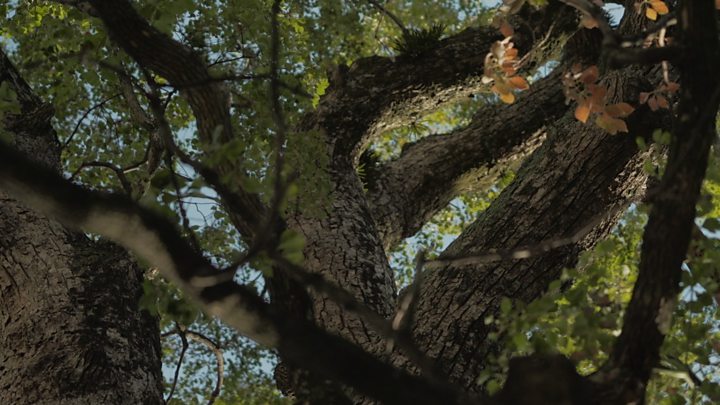Bells have tolled in Hiroshima, Japan, to mark the 75th anniversary of the dropping of the world's first atomic bomb.
But memorial events were scaled back this year because of the pandemic.
On 6 August 1945, a US bomber dropped the uranium bomb above the city, killing around 140,000 people.
Three days later a second nuclear weapon was dropped on Nagasaki. Two weeks later Japan surrendered, ending World War Two.
Early on Thursday, Japan's Prime Minister Shinzo Abe and the mayor of Hiroshima joined bomb survivors and descendants in the city's Peace Park.
The park is usually packed with thousands of people for the anniversary, But attendance was significantly reduced this year, with chairs spaced apart and most attendees wearing masks.
A moment's silence was held at 08:15, the exact time the bomb was dropped on the city.
"On August 6, 1945, a single atomic bomb destroyed our city. Rumour at the time had it that 'nothing will grow here for 75 years,'" Mayor Kazumi Matsui said.
"And yet, Hiroshima recovered, becoming a symbol of peace."
In a video message, UN Secretary General Antonio Guterres called on all nations to renew efforts to abolish such weapons.
"Division, distrust and a lack of dialogue threaten to return the world to unrestrained strategic nuclear competition," he said.
"The only way to totally eliminate nuclear risk is to totally eliminate nuclear weapons."
A train journey that saved a life
On the morning of 6 August 1945, Michiko overslept.
"I ran to Yokogawa station, and I jumped on my usual train in the nick of time," she wrote in her diary years later.
Michiko's sprint saved her life. It meant she was safely inside her workplace when her city - Hiroshima - was hit by the first nuclear bomb ever used in war.
"If I had missed my usual train, I would have died somewhere between Yokogawa station and Hiroshima station."
Read more: The day Michiko nearly missed her train
What happened in 1945?
Germany surrendered to Allied forces in May 1945, but World War Two continued in Asia as the Allies fought imperial Japan.
The United States believed that dropping a nuclear bomb - after Tokyo rejected an earlier ultimatum for peace - would force a quick surrender without risking US casualties on the ground.
On 6 August, the US dropped the first bomb - codenamed Little Boy - on Hiroshima. The attack was the first time a nuclear weapon was used during a war.
At least 70,000 people are believed to have been killed immediately in the massive blast which flattened the city. Tens of thousands more died of injuries caused by radiation poisoning in the following days, weeks and months.

Media playback is unsupported on your device
When no immediate surrender came from the Japanese, another bomb, dubbed "Fat Man", was dropped three days later about 420 kilometres (261 miles) to the south over Nagasaki.
The recorded death tolls are estimates, but it is thought that about 140,000 of Hiroshima's 350,000 population were killed, and that at least 74,000 people died in Nagasaki.
They are the only two nuclear bombs ever to have been deployed outside testing.
The dual bombings brought about an abrupt end to the war in Asia, with Japan surrendering to the Allies on 14 August 1945.
But some critics have said that Japan had already been on the brink of surrender and that the bombs killed a disproportionate number of civilians.
Japan's wartime experience has lead to a strong pacifist movement in the country. At the annual Hiroshima anniversary, the government usually reconfirms its commitment to a nuclear-free world.
After the war, Hiroshima tried to reinvent itself as a City of Peace and continues to promote nuclear disarmament around the world.
The bomb that changed the world
- The bomb was nicknamed "Little Boy" and was thought to have the explosive force of 20,000 tonnes of TNT
- Col Paul Tibbets, a 30-year-old colonel from Illinois, led the mission to drop the atomic bomb
- The Enola Gay, the plane which dropped the bomb, was named in tribute to Col Tibbets' mother.
- The final target was decided less than an hour before the bomb was dropped. Good weather conditions over Hiroshima sealed the city's fate
- On detonation, the temperature at the burst-point of the bomb was several million degrees
- The blast generated a vast shockwave which flattened buildings
- Thousands of people on the ground were killed or injured instantly
Media playback is unsupported on your device
https://news.google.com/__i/rss/rd/articles/CBMiLmh0dHBzOi8vd3d3LmJiYy5jby51ay9uZXdzL3dvcmxkLWFzaWEtNTM2NjAwNTnSATJodHRwczovL3d3dy5iYmMuY28udWsvbmV3cy9hbXAvd29ybGQtYXNpYS01MzY2MDA1OQ?oc=5
2020-08-06 01:57:58Z
52780967910197
Tidak ada komentar:
Posting Komentar